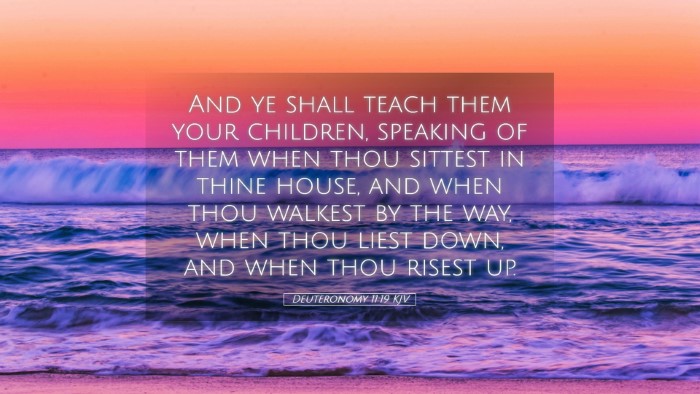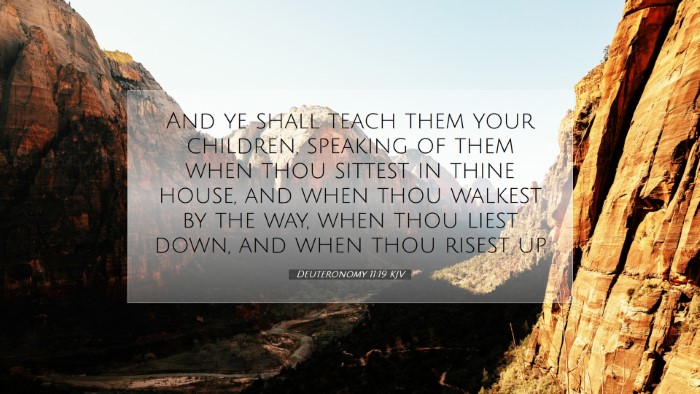Commentary on Deuteronomy 11:19
Bible Verse: "And ye shall teach them your children, speaking of them when thou sittest in thine house, and when thou walkest by the way, when thou liest down, and when thou risest up."
Introduction
Deuteronomy 11:19 serves as a profound instruction concerning the transmission of faith and values from generation to generation. It emphasizes the importance of teaching children the statutes and commandments of the Lord through everyday interactions. The significance of this verse has been explored through the lens of various public domain commentaries, offering insights that are beneficial for pastors, theologians, and scholars alike.
Teaching As a Lifelong Practice
The directive to teach children is not confined to formal settings but is intended to be integrated into the daily lives of families.
Matthew Henry comments on this saying that the education of children in religious matters should permeate all aspects of life.
Henry emphasizes that parents should seize every opportunity to instill God’s word in the hearts of their children, highlighting times of rest and activity.
Four Dimensions of Instruction
Deuteronomy 11:19 mentions four specific times for teaching:
- When thou sittest in thine house: This signifies the importance of family devotion and discussions around the home. Albert Barnes remarks that these moments provide a comfortable environment to explain and discuss God's laws.
- When thou walkest by the way: While traveling, parents can use the opportunity to observe nature and engage children in conversations about God’s creation. Adam Clarke points out that these conversations can nurture a deeper appreciation of God's presence in everyday life.
- When thou liest down: This time signifies bedtime routines where stories can be shared that recount God's faithfulness. Henry affirms the importance of ending each day with a reflection on God’s word.
- When thou risest up: The morning represents a fresh start and the opportunity for children to begin their day with Scripture, instilling a sense of purpose. Barnes suggests that a morning focus on God's commands can set the tone for the day ahead.
The Role of Parents in Spiritual Education
The verse underscores the critical role of parents as the primary educators of faith. Matthew Henry stresses that parents not only have the duty to teach but also to exemplify God’s commandments through their actions. It is a reminder that words can be complemented by living out the principles of the faith visibly and consistently.
Foundation of Faith
Adam Clarke highlights that teaching children in the ways of God is foundational to the survival of faith in future generations. If children are not adequately instructed, the faith may be lost. The onus lies heavily upon parents to represent God’s word faithfully, thus ensuring that the next generation remains grounded in biblical truths.
Community and Collective Responsibility
In addition to the household, there is a broader community aspect to consider. Barnes notes that this teaching is not solely a parental duty but also extends to the broader community of believers. Churches and congregations play a pivotal role in supporting families in their efforts to teach children, providing resources and communal teachings that reinforce biblical principles.
The Importance of Consistency
Consistency in teaching is paramount. Matthew Henry states that parents should be diligent and persistent, equipping children with a framework of understanding that they can return to throughout life. Repetition and reinforcement of biblical teachings help to engrain these truths in children's hearts and minds.
The Benefits of Teaching
The spiritual, emotional, and moral benefits of instilling biblical truths within children are vast. Adam Clarke mentions that children taught God's commandments are more likely to grow into individuals who value morality and integrity, contributing positively to society.
Challenges in Implementation
Despite the strength of this biblical command, Barnes acknowledges the challenges that modern families may face. The distractions of contemporary life, such as technology, busy schedules, and societal pressures, can hinder effective teaching. The verse serves as a charge to return to intentionality in family life and prioritize spiritual discussions.
Conclusion
Deuteronomy 11:19 is a seminal verse that encapsulates the heart of family devotion and the importance of teaching children the ways of the Lord. The insights from Matthew Henry, Albert Barnes, and Adam Clarke collectively underline the profound responsibility that parents and communities carry. It is a call to nurture the next generation in a love for God's word, ensuring that as they grow, they are equipped to navigate a complex world guided by biblical principles.


